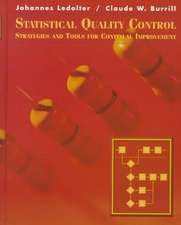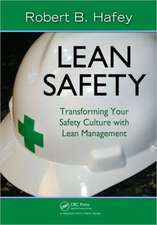Henry Ford's Lean Vision: Enduring Principles from the First Ford Motor Plant
Autor William A. Levinsonen Limba Engleză Hardback – 10 sep 2002
Praise from Industry Week, January 2003Japanese manufacturers have made concepts like kaizen (continuous improvement), poka-yoke (error-proofing), and just-in-time famous. When the Japanese began to adopt these techniques from the Ford Motor Company during the early twentieth century, they knew exactly what they were getting: proven methods for mass-producing any product or delivering any service cheaply but well.
"...In Henry Ford's Lean Vision...Levinson shows how the father of American mass production toiled to eliminate waste, instituted just-in-time delivery of inventory, and applied many other tools now identified with lean..."
Henry Ford's methods, however, went well beyond the synergistic and mutually supporting techniques that constitute what we now call lean manufacturing. They included the "soft sciences," the organizational psychology that makes every employee a partner in the drive for success.
In Henry Ford's Lean Vision, William A. Levinson draws from Henry Ford's writings, the procedures in his factories, and historical anecdotes about the birth of lean in Japan to show that the philosophy that revolutionized Japanese manufacturing was the same philosophy that grew the Ford Motor Company into a global powerhouse -- and made the United States the wealthiest and most powerful nation on earth. Levinson reveals how Ford was ahead of other modern visionaries and discusses why the very ideas that made his company such a success were abandoned in his own country, and why they finally found acceptance in Japan.
Henry Ford's Lean Vision is a hands-on reference that provides the reader with proven principles and methods that can be applied in any business or service enterprise. It covers all aspects of building and running a successful enterprise, including Ford's principles for human relationships and the management of physical resources.
Preț: 397.25 lei
Nou
Puncte Express: 596
Preț estimativ în valută:
76.01€ • 79.58$ • 62.90£
76.01€ • 79.58$ • 62.90£
Carte disponibilă
Livrare economică 17-31 martie
Livrare express 28 februarie-06 martie pentru 43.13 lei
Preluare comenzi: 021 569.72.76
Specificații
ISBN-13: 9781563272608
ISBN-10: 1563272601
Pagini: 400
Ilustrații: illustrations
Dimensiuni: 156 x 234 x 25 mm
Greutate: 0.73 kg
Ediția:1
Editura: Taylor & Francis
Colecția Productivity Press
Locul publicării:Oxford, United Kingdom
ISBN-10: 1563272601
Pagini: 400
Ilustrații: illustrations
Dimensiuni: 156 x 234 x 25 mm
Greutate: 0.73 kg
Ediția:1
Editura: Taylor & Francis
Colecția Productivity Press
Locul publicării:Oxford, United Kingdom
Public țintă
Professional and Professional Practice & DevelopmentRecenzii
"Henry Ford's Lean Vision could have been written about the Theory of Constraints (TOC) as much as about Lean! To understand better TOC's concepts of Throughput World, satisfying all of the stakeholders, creating value, managing the supply chain and the constraint, the reader need only look into the fundamentals and principles of Henry Ford in Mr. Levinson's book. The book captures the idea that sustainable success must come from an integrated approach of leadership, methodology, culture and organizational alignment. Anyone who is trying to implement Theory of Constraints or Lean or other improvement methodologies should read and reread this book. Its historical analogies and numerous references to the more modern gurus make it an interesting and enjoyable read!"
Dee Jacob, Partner, The Goldratt Institute 06/01/04
Dee Jacob, Partner, The Goldratt Institute 06/01/04
Cuprins
IntroductionWhat to Expect from this BookBackground ResourcesChapter by Chapter OverviewChapter 1: Brave New World: Changing How the World WorksThe Bottom Line: Ford's Results Speak for ThemselvesDefining Lean EnterpriseFord's Basic PrinciplesChapter 2: Ford's Principles: The FoundationNatural LawFord and Eastern Philosophy: The Japanese ConnectionContinuous Improvement: KaizenBringing Win-Win to the WorkplaceServiceChapter 3: Ford on Labor RelationsManagement and Labor as PartnersNo Free Lunch: A Key ConceptHuman Resource PracticesEmployee Housing and StoresChapter 4: Principles for Organizational and Personal SuccessPersistenceInitiativeBreaking Down Organizational BarriersCorporate Culture at the Ford Motor CompanyHow the Ford Motor Company Lost Its CultureChapter 5: Perceiving Genuine ValueA Warning to the United StatesEverything Must Add ValueMiddlemen Do Not Add ValueAdvertising as WasteNo Free LunchChapter 6: Ford on Economics, Government, and Health CareBusiness CyclesThe Stock Market Should Be Irrelevant to National ProsperityThe Role of Inexpensive EnergyThe Role of GovernmentHealth CareChapter 7: Eliminate WasteEverything But the SquealISO 14000 Is FreeChapter 8: Ford's FactoryThe Factory and the WorkerContinuous Improvement: KaizenLean Manufacturing5S-CANDOJust-In-Time (JIT) Manufacturing and Inventory ReductionDesign for Manufacture and Design for AssemblyProcess Simplification and ImprovementPackaging and DeliveryPoint-of-Use AssemblyOccupational SafetyQuality ControlChapter 9: Customer and Supplier RelationshipsIdentifying Markets and Creating DemandPricing StrategySupply Chain ManagementChapter 10: Frederick Winslow Taylor and Scientific ManagementDid Taylor
Descriere
Praise from Industry Week, January 2003
"






![Using Hoshin Kanri to Improve the Value Stream [With CDROM]: From Theory to Practice](https://i3.books-express.ro/bt/9781420084238/using-hoshin-kanri-to-improve-the-value-stream-with-cdrom.jpg)







